- Home
- Gavin Chappell
The Kingdom That Rome Forgot Page 2
The Kingdom That Rome Forgot Read online
Page 2
Robed scholars gathered in small, quietly conversing groups in the shade of the colonnade. Flaminius found somewhere to tie up his horse and went looking for the lecture theatre where Claudius Mercator would be addressing the public.
‘A public lecture?’ asked the Greek greybeard Flaminius first asked. ‘I don’t believe we have any scheduled. I certainly know nothing of any lectures for the public.’ He stressed the latter word as if he felt sullied by its utterance.
‘Claudius Mercator,’ Flaminius said patiently. ‘The famous merchant?’
‘The famous charlatan,’ said the Greek disapprovingly. His hands shook with palsy as he flapped them in dismissal. ‘I don’t think you’re likely to find him in the Museum.’
He turned away, as if the interview was at an end. Clearly he was about to saunter off to the far side of the court where several other Greek intellectuals were discussing whatever abstraction was the topic of the moment.
It was still hot enough for Flaminius to feel impatient. To help his pose as a young wealthy Roman throwing his money about in the provinces, he had donned a purple dalmatic that was in serious violation of several sumptuary laws, and hot to boot. His sweat pooled unpleasantly on his flesh beneath the garment, and as it did so, his temper became increasingly brittle.
‘I was told that he was addressing the public this evening,’ said Flaminius. ‘All Alexandria is speaking about his latest venture. Surely you’ve heard? He says he’s found a new route to the lost city of Garama, in the Libyan Desert.’
The greybeard looked blank. ‘I have heard nothing of the sort. How very interesting. I have read that in such regions live men who have lost the ability to speak and yet utter imprecations against the sun, which is inimical to their country, that other folk worship only the gods of the underworld, still others have no heads, but keep their eyes and mouths in their breasts, that still other people are hairy and bestial, and even have the heads of dogs. I read that serpents are so large in those regions that they devour one whole, and have been known to attack passing ships. Tell me, have you read Aristotle’s On the History of Animals…?’
‘Can’t say I have, friend,’ said Flaminius brusquely. ‘Maybe you should read less and spend more time keeping up to date. Is there anyone who’s likely to know where I should go?’
The greybeard shrugged. ‘Try the Library,’ he suggested, and moved away.
Flaminius bit his lip. He really didn’t want to set foot in the Alexandrian Library, but it seemed that Fate was against him.
And as he entered the vast, echoing marble hall with its long stacks of books, illuminated by shafts of light from openings in the roof, dotted with scattered groups or individual scholars, he saw with a sense of tragic inevitability reminiscent of Sophoclean tragedy that Ozymandias was manning the inquiry desk. Perhaps if Flaminius just gouged his own eyes out it would appease the angry gods…
‘Evening,’ he said breezily, halting by the desk. ‘I’m looking for a lecture.’
Ozymandias didn’t look up immediately. He had seen Flaminius coming—anyone approaching the inquiry desk across that echoing indoor desert could be seen from far off. But now he was making a notation in a scroll, then waddling across to another desk to compare the first scroll with a second, pausing to sharpen his stylus, brushing a stray thread off his linen loincloth… When he had made his point, he looked up.
‘Tribune,’ he said. ‘Is this a new code?’
‘Now, don’t be difficult,’ Flaminius said. ‘I’m supposed to be going to Claudius Mercator’s public lecture. Can you tell me where it is, please, and be quick about it? It started a quarter of an hour ago.’
‘And why should I help you?’ the Egyptian asked.
‘Because it’s your job,’ said Flaminius furiously, ‘and because I pay you a substantial stipend to provide me with intelligence. Usually rather more complicated information than this. Where is the lecture?’
‘Yes, you pay me well,’ said Ozymandias, ‘but do you pay me for information or do you pay me so you can make my wife your whore? That wasn’t in the contract.’
‘For Jove’s sake,’ Flaminius raged in a whisper that nevertheless carried so far that distant scholars turned to gaze at him in disapproval. He lowered his voice still further. ‘I’ve already apologised for what happened. We’d all had a bit too much to drink. You fell asleep, as I remember.’
‘Yes,’ said Ozymandias bitterly, ‘but I woke up. And what did I find? You and Nitocris… together. And it’s not as if I hadn’t suspected something for some time, but to actually see the two of you…’
‘Alright!’ said Flaminius. ‘There was one other time. But that was different. That was necessary.’
‘And this time was because you were drunk?’ Ozymandias asked. ‘And what about next time?’ he went on sadly. ‘What will be the excuse next time?’
‘I swore by the infernal gods I’d not go near your wife again,’ Flaminius reminded him. ‘Now will you please tell me where Claudius Mercator’s giving his lecture?’
‘Possibly,’ said Ozymandias, fidgeting with his stylus. ‘But you’ll have to make it worth my while. I need some strings pulled.’
‘Can we discuss this later?’ Flaminius said. ‘I’m here on an official mission, you know. Security of the empire at stake, all that kind of thing.’
‘When isn’t the security of the empire at stake?’ asked Ozymandias. ‘What about my own petty concerns?’
‘Your own petty concerns are petty, as you admit,’ said Flaminius. ‘So you can stick them up your loincloth and tell me where the lecture is, like a good little Egyptian.’
Considering Ozymandias had married his own sister—it was an accepted custom among the Egyptians, barbarians that they were, but it still gave Flaminius the shudders—he hardly commanded the moral high ground, to the tribune’s mind. But he did have the whip hand right now.
‘I’ll tell you that,’ the Egyptian said, ‘but you’ve got to do something for me.’
‘I don’t have the budget to increase your pay,’ Flaminius said wearily.
Ozymandias shook his head. ‘It’s not money,’ he said. ‘It’s my nephew.’
‘Which nephew?’
Ozymandias had whole tribes of nephews and nieces, some in Alexandria, some in other parts of the province.
‘Amasis,’ Ozymandias said. Flaminius groaned. ‘Yes, yes, the bumptious one,’ the Egyptian went on. ‘You’ve met him a couple of times. My cousin wants him to learn a trade, he wants to see the world. I suggested some merchant takes him on. I said I had friends in high places. Can’t you use your influence?’
‘A merchant?’ said Flaminius, gaping at him. ‘Well, I don’t known, perhaps there’s a chance I could put in a good word. But I won’t be able to do that until you tell me where Claudius Mercator’s giving his lecture.’
‘Promise?’ said Ozymandias. ‘Solemn oath, by Osiris and Isis and Horus.’ Flaminius nodded vigorously, and swore. ‘Lecture Theatre III,’ the Egyptian said. ‘But you’d better hurry—it’s already halfway through.’
Cursing the gods of Egypt and their stiff-necked sons, Flaminius hurried down a cool, shadowy marble corridor.
He halted at a doorway. Two big slaves with the look of Thracians stood outside two even bigger elaborately carved doors of cedar of Lebanon. From within came the nasal whine of a lecturer.
The bigger Thracian shook his bearded head. ‘You’re late,’ he rumbled. ‘You can’t go in, citizen, the lecture’s in session.’
‘I’ve got to attend it,’ said Flaminius desperately. ‘Can’t you make an exception?’
The Thracian eyed Flaminius’ flashy garments. ‘I don’t care who your father is, citizen,’ he said, ‘rules is rules. The lecture’s in session, nobody goes in.’
Flaminius blew out his cheeks. The day was not going well. He really wasn’t supposed to do this—apart from anything it was breaking cover. But he had to attend that lecture.
He produced the lance-head brooch
that identified him as an agent of the Commissary, the imperial secret police. ‘In the name of the emperor,’ he said formally, ‘open those doors and let me inside.’
A few seconds later he was slipping through a grudging crack between the two doors, with a muttered thanks to the awestruck Thracians. He entered the quiet, musty atmosphere, pregnant with avid attention, of the lecture theatre.
Sitting in rows on a mosaic floor was a motley crowd of scholars and citizens. Standing in the open space before them, gesticulating eagerly, was a small, comical figure. A man in late middle age, with a bald head and an elegant, oiled beard, clad in a patched, second hand toga, he had swarthy Levantine features, a hooked nose, and wild eyes.
Flaminius pushed his way past the people sitting at the back, enduring many a disapproving look and a hissed ‘Shush!’, before settling down near the front.
‘…until Julius Maternus travelling from Leptis Magna briefly reopened the route…’ the man was saying.
Flaminius could only assume he was Claudius Mercator. He noticed, standing in the shadows behind him, a bearded, black skinned man clad in a leopard skin loincloth and a necklace of lion claws.
An Ethiopian, Flaminius told himself. Not a complete rarity in Egypt, Alexandria at least, nevertheless the inky blackness of his skin was an unusual sight.
‘His Geography, which I found in your wonderful library,’ Claudius Mercator added with a twinkle at the stony faced Greek scholars, ‘describes how he travelled for many weeks south across the desert from the Gulf of Syrtis, despite suffering greatly from the depredations of the nomads, and won through to Garama. Here Maternus became a confidante of the Garamantian king and rode with him in war against the fierce tribes of Agysimba, the king’s rebellious subjects, before exploring a great lake, and later returned to Rome with a two horned rhinoceros that was exhibited in the Colosseum.
‘When I tried to follow this route, I discovered that the wells had all been filled in by the nomads, and my first attempt was abortive. But I am glad to relate that I successfully discovered a new route, beginning at the oasis of Ammon. It is longer than that from Leptis Magna, but currently untroubled by the nomads.
‘Accompanied by a group of Nasamonean horsemen, I crossed the desert this summer and came down into Phazania, reaching Garama itself in disguise. It was while visiting the temple there disguised as a pilgrim that I noticed the presence of what could only be the famous veil of Tanit, which I believe has already become the gossip of the province. Sadly my disguise was penetrated and my companions and I were driven from the kingdom or killed as spies. My remaining companions vanished into the desert during the return journey. I alone, but for Menander, a slave I had purchased in the Garama market, successfully made it back into the empire this summer.’’
A scholar asked him a question about the temple of Tanit. He shrugged in reply. ‘Of cult matters I know nothing, but I do know that a second expedition will be sufficient to open up a new trail into the interior, leading straight to the heart of the Garamantes kingdom. Gold, ivory, slaves, salt, natron, carbuncles, and wild beasts for the arenas of the empire are all there for the taking of any man courageous enough to follow the stars and dare the pathless, waterless desert.
‘Another group of riders is now camped in the deserts of Cyrenaica, in Ammonium, on the edge of the empire, near the far famed temple of Jupiter Ammon. They are eagerly awaiting my return, having agreed to protect me on my journey. When I told them my tale they wanted to set out at once, without preparation, , so enthusiastic are they to join in my venture, but I am an old hand when it comes to caravans, and I knew that we must be properly prepared if we are to succeed, and winter would be a better time to travel than summer. And so I come before you all, beseeching your aid.’
‘You want our aid,’ said a grey bearded scholar. Flaminius recognised him with surprise as the palsied old Greek he had spoken to earlier. It seemed he had taken his advice! ‘Pecuniary aid, I assume. But what can you promise in return? Who benefits?’
‘Naturally,’ Claudius Mercator oozed, ‘any man bold enough to partially or entirely finance our caravan will be recompensed from the profits of the venture.’
But the old man looked oddly disappointed.
‘Profits, you say,’ said a tall, keen eyed fellow with a long moustache and beard of prematurely white hair. His voice was filled with world weariness An Arab of some kind, Flaminius thought, but a Hellenised Arab rather than a visitor from Arabia Felix: his Latin was good, and no doubt his Greek would be better. ‘And what profits will there be at the end of the road? The demand for all these commodities is large in Roman lands and elsewhere. But your costs must be great. What of these Nasamoneans you are employing? Mercenaries, are they? Are they not connected with the Garamantes? Why should they help you open up Phazania? Are they trustworthy?’
‘I would trust them with my life,’ Claudius Mercator protested. ‘Indeed I have already done so. They proved themselves better protection than the men who accompanied me on my first journey to Garama.’
‘But,’ said the tall Arab, ‘would you trust them with so rich a cargo as the one you describe? Are they nomads? Masterless men? Don’t trust them, that’s my advice. I trusted the Saracens of the desert as a boy, and learnt my error bitterly when they plundered my caravan in the night leaving me stranded hundreds of miles from the nearest waterhole: I was lucky to survive. Survive I did, and I went on to hunt every man of them down and bring about their death. But the only profit in that venture was to my honour. I made not a shekel.’
‘You will make many shekels from financing this venture,’ Claudius Mercator assured him. ‘You will be one of the first merchants to participate in the new trade across the Libyan Desert. They need oil, wine, glassware. In return they will trade slaves, gold, ivory…The potential for profit is enormous. Get in there at the start, and your profits would grow exponentially. But for that to happen, you need to ensure that the trail is blazed. No profit is made without risk, but the profit itself would be worth more than all the gold of Croesus, all the fabled trade of Tartessus. No? You’ll not risk your capital?’
‘I’ve not said that,’ the Arab began.
‘Nor have I,’ added the Greek thoughtfully. ‘In fact…’
Flaminius rose and stepped out onto the floor of the lecture hall.
‘I’ll risk my money,’ he said cheerily. ‘After all, I’ve got plenty of it to throw around since Pater passed over. Only a couple of stipulations, old man. Firstly, I come with you.’ He looked round at the sea of startled faces. ‘I’m bored with city life,’ he went on, ‘and the desert air would do me good. Oh, and another thing. I’d like to bring along a young friend.’
The Arab stared at him in utter bewilderment. The Greek peered at him, troubled. And Claudius Mercator broke out into laughter.
—3—
Alexandria, Gate of the Moon, Province of Egypt, Calends of November 124 AD
A month later, Flaminius was still feeling resentful at his initial reception.
He waited with only a single companion in the street outside the city’s eastern gate. As the sun rose in the late winter skies, he remembered the difficulty he had experienced.
Although it was nowhere near as hot as it would become later in the year, being much like Britain on a hot, rainless, summer’s day, it was still sultry enough to be causing him to scowl. He shaded his eyes and peered into the dusty distance. The road out of the city was already busy, with people of a dozen nations and hues passing by on foot or mounted: the latter on horses, dromedaries, even elephants. But there was no sign of the people he was supposed to meet.
He sat down on a chest that was part of the pile of luggage, and sighed.
‘Are they late?’ said Amasis, hopping from foot to foot. ‘Are they late, Uncle Gaius? Are they? Do you want me to run and see what’s keeping them?’
Flaminius glanced up at the lad wearily. ‘You’d probably better stay here with me,’ he said. ‘And I keep telling you
, I’m not your uncle.’
Egyptian families, with their consanguineous marriages, got pretty complicated, but even if he had slept with the lad’s aunt occasionally, that didn’t make him family.
‘Sorry, Uncle Gaius,’ said Amasis. He peered up the street, adopting the same pose Flaminius had struck previously. ‘What do you think’s keeping them?’ he added.
‘Incompetence, probably,’ said Flaminius. He regarded the youth.
About seventeen winters old, Amasis had the skinny, angular look of most Egyptian youths his age, with long, sticklike limbs that reminded Flaminius of a mummy. He wore his black hair in short bangs over his forehead, and his ears stuck out like amphora handles. His nose was snub, his kohl rimmed eyes were black and deep. His linen tunic was cinctured with a narrow belt from which hung a dagger, whose pommel he caressed uncomfortably.
‘What do you mean?’ Amasis said. ‘Isn’t Claudius Mercator any good? They say he’s explored everywhere from Greater India to the Pillars of Hercules, opening up trade routes where there were none before. That’s what they say in the wine shops.’
Flaminius frowned. ‘Does your aunt know you go to places like that?’ he asked. ‘You should take wine shop rumour with a pinch of salt. He’s got about a bit, that’s clear. I really doubt he’s ever been as far as India. And what he’s best known for is getting money out of people by false pretences.’
‘But aren’t you giving him money?’ Amasis asked guilelessly. He grinned, revealing several gaps in his teeth. ‘You’re financing his caravan.’
‘Not just me,’ Flaminius reminded him. ‘Vabalathus the Arab and the geographer Demetrius of Oxyrhynchus have equal shares with me in this venture.’

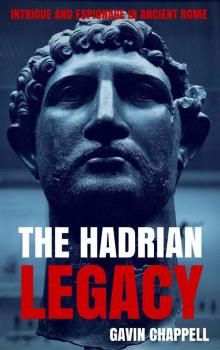 The Hadrian Legacy
The Hadrian Legacy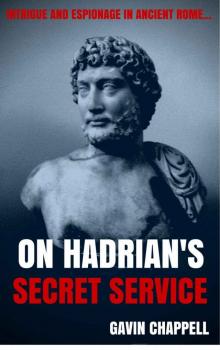 On Hadrian's Secret Service
On Hadrian's Secret Service Murder in Hadrian's Villa
Murder in Hadrian's Villa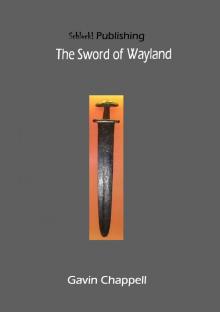 The Sword of Wayland
The Sword of Wayland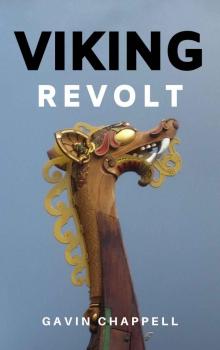 Viking Revolt
Viking Revolt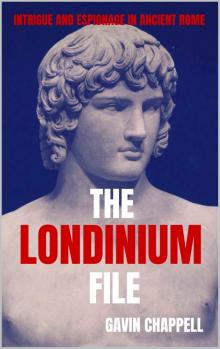 The Londinium File
The Londinium File The Gladiator Gambit
The Gladiator Gambit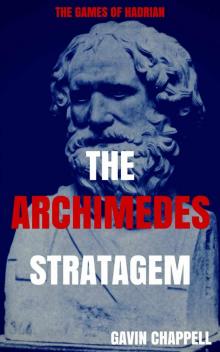 The Archimedes Stratagem
The Archimedes Stratagem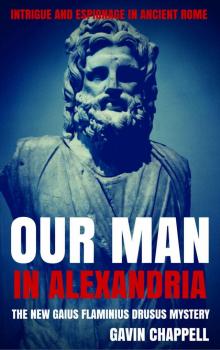 Our Man in Alexandria
Our Man in Alexandria Into the Void (The Dungeoneers)
Into the Void (The Dungeoneers)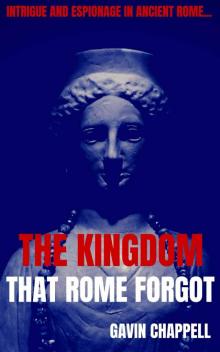 The Kingdom That Rome Forgot
The Kingdom That Rome Forgot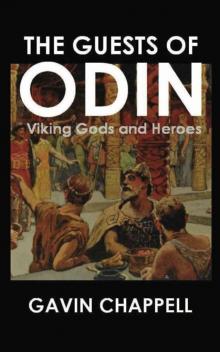 The Guests of Odin
The Guests of Odin